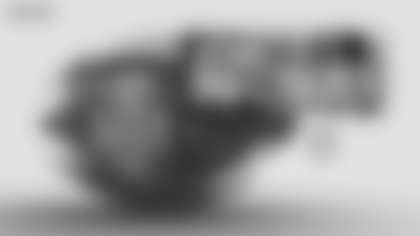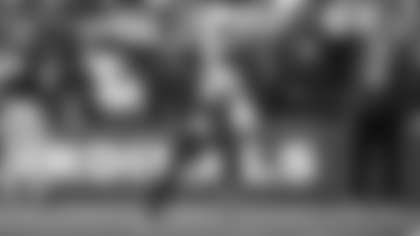Cardinals defensive tackle Calais Campbell was injured on an illegal chop block against the Broncos in 2014. A rule change makes them all illegal.
Chop blocks have been outlawed, and two unsportsmanlike penalties in specific categories can now result in an automatic ejection.
The NFL competition committee made those modifications and eight other rule changes during the annual owners meetings this week in Boca Raton, Fla.
Cardinals cornerback Patrick Peterson tweeted his gratitude for chop blocks becoming illegal, since defensive players dislike the practice of a blocker coming in low when another player is already engaging him up high. They were already outlawed on passing plays, and now nose tackle Xavier Williams said it will allow defenders to flow to the ball without being tentative on running plays.
"I'm happy about it, because there are some teams that literally chop every play, every other play," Williams said. "Especially those hard outside zone teams. You get too close, and iffy or not, they just dive in and let the refs decide. That gives us a lot less to think about. Sometimes you get chopped a couple times and it slows you down. It has you thinking, 'Well, you kind of rolled my ankle up last time. I don't want that to happen again.' I think it's going to allow defensive players to get after it a lot harder."
The full list of rule changes are as follows:
- Moves the line of scrimmage after a touchback to the 25-yard-line. The receiving team previously started at the 20.
- Makes two personal fouls in specific categories result in an automatic ejection.
- Permanently moves the line of scrimmage for Try kicks to the defensive team's 15-yard line, and allows the defense to return any missed Try.
- Permits the offensive and defensive play callers on the coaching staffs to use the coach-to-player communication system regardless of whether they are on the field or in the coaches' booth.
- Makes all chop blocks illegal.
- Changes the need to place an injured reserve/designated for return tag on a player immediately. Players still need to sit a minimum of six weeks, but the team can decide to bring back the player at a later date.
- Expands the horse collar rule to include when a defender grabs the jersey at the name plate or above and pulls a runner toward the ground.
- Makes it a foul for delay of game when a team attempts to call a timeout when it is not permitted to do so.
- Eliminates the five-yard penalty for an eligible receiver illegally touching a forward pass after being out of bounds and re-establishing himself inbounds, and makes it a loss of down.
- Eliminates multiple spots of enforcement for a double foul after a change of possession.
The ejection rule is on a one-year trial as the league will see how it affects the action. Players can get ejected for two unsportsmanlike penalties in specific categories, including throwing a punch or kick even if they don't land, taunting or abusive language.
"I'm all for it," team president Michael Bidwill told NFL Network before the rule was enacted. "Unsportsmanlike conduct is not part of football, and if somebody has one, that's a real problem. But two, I'm all for getting them out of the game. That will send a strong message that we're going to play by the rules and play in a sportsmanlike manner. We've got millions of kids watching our players play, and we've got to play the game properly."
Before the ruling was solidified, Cardinals running back David Johnson wondered if a blanket rule could have unintended consequences.
"That's a tough one because I feel like some guys are so into the game," Johnson said. "If a guy gets two, but the second one is nothing serious, and he gets ejected? That makes a big difference, especially if it's a starter, somebody valuable to the team."
The owners seemingly heard those concerns, and now the automatic ejections are limited to certain categories.
There was a lot of confusion on catch rulings during the season, but no changes were made to those interpretations.















